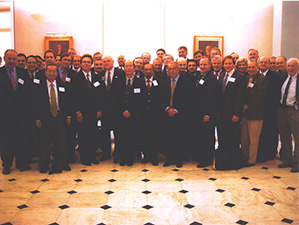GERD Consensus 2003
 |
|---|
This monograph represents a compilation of the presentations delivered at the Yale University School of Medicine GERD Consensus Meeting (GERD Then and Now)|of November 16, 2002. The subject of acid-related diseases, and particularly gastro-esophageal reflux, has been explored in considerable depth over the last decade as the magnitude of the clinical problem has become apparent. Although the topic has been explored in the past, it has become obvious that previous concepts in regard to both the biological evolution of the disease process, particularly Barren's esophagus and the pharmacological and surgical management of the clinical problems require considerable farther attention. Although the utility of endoscopy and biopsy has been well recognized in terms of staging and biopsy, it is evident that non-erosive GERD constitutes a problem in diagnosis and that the identification of mucosal transformation is both difficult to identify and intricate in its precise characterization. Early considerations that the disease could be managed with facility have been confounded by a number of issues including the recognition that GERD included a broad spectrum of clinical manifestations, and that quality of life was dramatically reduced if clinical management was inadequate.
The further realization that transformation of the mucosa is a relatively common and potentially serious event has engendered growing concern as the incidence of esophageal neoplasia continues to rise. In respect of symptom management, the enthusiastic claims proposed on behalf of surgical intervention require rigorous assessment in the light of the proven remarkable efficacy of the proton pump inhibitor class of agents. An especially cautious assessment of the optimistically unrealistic preliminary reports of novel experimental endoscopic antireflux procedures is needed to define whether such interventions have adequately satisfied clinicians that they have moved beyond the stage of experimentation. In addition, it has become more and more apparent that a major shortcoming is the absence of a satisfactory assessment tool enabling clinicians the opportunity to adequately and reliably compare and contrast the symptoms of their patients and calibrate the response to therapy in a fashion that facilitates an objective analysis of the efficacy of therapy. Mindful of these major issues that require further exploration and resolution, it was determined that a consensus meeting should be held at Yale University Medical School to address such areas of controversy and to illuminate the current state-of-the-art in respect to the biology, diagnosis and management of GERD. An international faculty of experts could be assembled to opine on the current state of GERD. Their collective knowledge and experience has been collated to enable review of the material presented and to provide a consensus document memorializing both the individual and collective views of physicians gathered from eighteen different countries.